The Forgotten (Part 2): The Uyghurs of Xinjiang–from Sinicization to Genocide
TRANSCEND MEMBERS, 27 Nov 2023
Prof Hoosen Vawda – TRANSCEND Media Service
Please note that this publication contains graphic images and reports of human suffering, which may be disturbing to some readers. Parental guidance is recommended for minors, who refer to this publication as a resource material.
**
“Authoritarian regimes create alibis to justify their hidden agenda of ethnic cleansing and genocide. They institute “states of exception” and “emergency resolutions” to bypass the rule of law. Countries like China, India and Israel substitute their own self-appointed notion of “right” to regularly violate human rights doctrinal conventions.” [i],[ii]
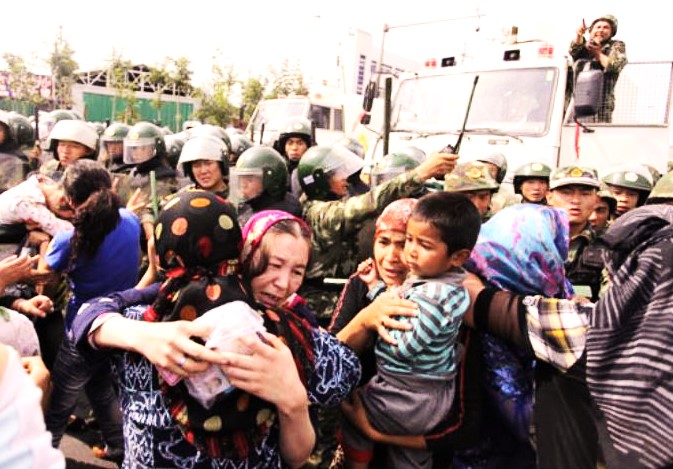
Massive police presence at a protest by Uyghurs in China’s Xinjiang region in 2016. The Chinese government is increasing on its repression of Uyghurs. It is setting a dangerous example of how to use “anti-terrorism” to justify authoritarian practices, especially after 911. In February 2019, Mohammed bin Salman, Saudi Arabia’s crown prince and defacto leader, declared on Chinese state television, “China has the right to carry out antiterrorism and de-extremization work for its national security.” He was following the usual script that China has used repeatedly to cover up its violations of the human rights and ongoing abuses of the Uyghur people in Xinjiang province. [1] Photo Credit: Wikimedia Commons
This paper, Part 2, in the series on the Forgotten Communities, globally, highlights the origins, history, traditions and religion of the forgotten Uyghur citizens in present day China and the cultural as well as physical genocide of these unique sector of the Chinese people, found in the Xinjiang Provinces, which literally translates as the “New Frontier”. In China the entire Uyghur population has been classified as “terrorist”.[2] China has hence developed a massive and programmatic response to such “extremism” by inaugurating concentration camps that extract labour, as well as they suppress any independent thoughts, beliefs, cultural values, language, even food, that evinces Muslim, Islamic identity, amongst a sector of its citizenry. The global community and the global leaders have literally forgotten this Uyghur community of Muslims over the centuries, and who are presently, experiencing problems and serious challenges, in China, as the Muslims are experiencing in Kashmir[3] under the BJP government of India, as well as the Gazains in Israel. The plight of the Uyghurs is one of Sinicization[4], ethnic cleansing, by intense monitoring by the Chinese government, analogous to the facial recognition technology used by the Israeli Government against the Palestinian in Gaza[5] as well as the occupied territories since the June 1967 war. using advanced technologies, and incarcerating them into detention centres on the pretext of vocational training and assimilating these Muslims into the Chinese culture. Many have demised in the process, others are gone missing and yet most are used as forced labour in these so, officially described as Vocational Training Centres by the Chinese government[6]. In fact. as many as 380, such centres have been built, in China,[7] which are used to mentally re-programme these grown up adults, who had the misfortune to be born as Muslim individuals. Their only sin was that they follow the general Islamic culture and traditions, for over a millennia.
The Oppression of the Uyghurs by China: Islamic Ethnophobia[8]
The Uyghurs are a predominantly Muslim ethnic minority group concentrated in the Xinjiang region of northwest China. In recent years, the Chinese government has taken increasingly repressive actions against the Uyghurs in Xinjiang in the name of combatting extremism and terrorism. These actions have included:
- Mass detentions of hundreds of thousands, possibly over a million, Uyghurs and other ethnic minorities in “re-education camps” beginning around 2017. Detainees are forced to renounce their religion and culture and swear loyalty to the Chinese state[9].
- Pervasive high-tech surveillance systems including facial recognition cameras, DNA sampling, cell phone monitoring, etc. aimed at controlling the Uyghur population.
- Restrictions on Islamic practices, such as bans on long beards, head scarves, fasting during Ramadan[10]. Mosques have been destroyed or shut down.
- Coercive labor programs where Uyghurs are sent to work in factories across China. This disrupts traditional community and family structures.
- A large “transfer” of Han Chinese[11] into the Xinjiang region to dilute the Uyghur population and culture.
- Severe restrictions on Uyghur language education and religio-cultural practices.
- Lack of access to adequate healthcare: There is a shortage of medical facilities and doctors in the predominantly Uyghur regions of Xinjiang[12]. Uyghurs also face discrimination in healthcare system.
- Spread of infectious diseases: Mass detention camps and poor conditions have led to the spread of infectious diseases like tuberculosis among the Uyghur population. Lack of transparency has worsened outbreaks.
- Poor nutrition: Food insecurity and poverty have resulted in nutritional deficiencies among Uyghurs, especially for children. This leads to issues like anemia, stunted growth, etc.
- Mental health crisis: The cultural genocide, family separations, fear of persecution and loss of identity have caused widespread trauma and mental health issues among Uyghurs. Depression and suicide rates are very high.
- Forced sterilisations: There are credible reports of Uyghur women being forcibly sterilized to control the population. This violates reproductive rights.
- Organ harvesting: Some evidence suggests Uyghurs and other prisoners may be targeted for involuntary organ harvesting, but more investigation is required to confirm this.
- Human experimentation: Rumors persist of medical experimentation on Uyghur prisoners[13] without consent, but there is limited evidence currently available.
- Withholding medical treatment: There are reports of Uyghurs being denied treatment as punishment or lacking proper care in detention camps.
- Spread of drug resistant diseases: Over prescription of medicines like antibiotics in camps may be leading to more drug resistance infections circulating among Uyghur population.
- The excessive restrictions, camps, and persecution undermine the physical and mental health of the Uyghur people in ways that will likely have long lasting inter-generational effects. Independent monitoring is needed to fully assess the scope of health is
There have also been reports of disproportionately high rates of HIV infection among the Uyghur population in China, as well as allegations that Uyghurs are being denied proper medical treatment. However, the full facts are difficult to confirm independently given the lack of transparency and access to Xinjiang province. A summary of what is known:
- In 2002, health officials reported an HIV epidemic in Xinjiang, with infection rates much higher among Uyghurs than the Han Chinese population[14]. The initial outbreak was linked to intravenous drug use and unsafe blood collection practices.
- Lack of culturally sensitive public health policies and discrimination were cited as reasons for the rapid spread of HIV among Uyghurs in the early 2000s.
- More recent data is scarce, but some estimates suggest the HIV rate among Uyghurs may be dozens of times higher than the national average. However, the Chinese government has contested such figures.
- Reports indicate that Uyghurs are facing discrimination in access to healthcare and antiretroviral treatment for HIV. Detention camps are also feared to be a breeding ground for infectious diseases due to poor conditions.
- Enforced sterilizations may also increase risk of HIV transmission.
- However, some first-hand accounts also suggest the Chinese government has increased HIV testing and treatment availability in Xinjiang, though focused on Han Chinese residents.[15]
There appears to be credible evidence of an ongoing HIV epidemic disproportionately affecting Uyghurs, combined with discrimination in healthcare access[16]. However, data is limited and politicized. More independent scientific studies are needed to accurately assess the extent of the problems and advocate for improved public health policies for Uyghurs in China. Claims of genocide or bioterrorism through HIV appear to be unsubstantiated propaganda at this point, though concerns persist about healthcare disparities,
Most independent observers characterise China’s policies towards Xinjiang and the Uyghurs as cultural genocide and a violation of human rights meant to forcibly assimilate the minority population. However, the Chinese government defends its actions as necessary counter-terrorism efforts. Restricted access to the region makes independent verification difficult.
The Origins of the Uyghurs[17]
- The Uyghurs are a predominantly Muslim ethnic group concentrated in the Xinjiang Uyghur Autonomous Region of northwest China[18].
- They speak the Uyghur language, which is part of the Turkic family of languages.
- Genetically and culturally, they are closely related to ethnic groups across Central Asia such as Uzbeks, Kazakhs and Kyrgyz[19].
- The Uyghurs are considered to be the indigenous people of the Tarim Basin area of what is now Xinjiang province. Archaeological evidence traces Uyghur history in the region back over 4,000 years.
- In the 8th century, the Uyghur Khaganate was established as a powerful kingdom that adopted Manichaeism[20] and Buddhism as official religions.
- In the 10th century, Islam was first introduced to Uyghur nobility through contacts with Persian and Arab traders. Over the next few centuries, Islam slowly spread across the Tarim Basin[21] and became ingrained in Uyghur culture.
- In the 18th century, the Qing dynasty took control of Xinjiang[22]. Uyghurs rebelled repeatedly against Qing rule. When the Qing fell in 1912, Uyghurs declared independence but were brought under ROC control.
- In 1949, the new Communist government seized Xinjiang. In 1955, the Xinjiang Uyghur Autonomous Region was established, at least nominally giving Uyghurs some autonomy.
- Many Uyghurs desire true independence or greater autonomy. Uyghur dissidents and activists have been routinely suppressed by the Chinese government, leading to ongoing tensions.
- Details about the phenotypes and ancestry of the Uyghur people compared to other Chinese ethnic groups: In terms of physical appearance, Uyghurs often have more stereotypically “Caucasian” features compared to China’s majority Han population. These include rounder eyes, higher nose bridges, and more facial hair among men.
- However, there is a fair amount of diversity within the Uyghur population. Some may appear more East Asian looking while others can pass for European. Skin tones range from fair to light brown.
- Genetically, modern Uyghurs reflect a mix of European and East Asian ancestry. DNA analysis suggests an admixture of Western Eurasian genes (around 40-50%) and Eastern Eurasian genes (around 50-60%).[23]
- The Western Eurasian portion reflects their indigenous roots in the Central Asian region prior to Turkic and Mongol migrations. The Eastern genes reflect mixing with Han Chinese, Mongol, and Turkic peoples over centuries.[24]
- In particular, Uyghurs share a close genetic relationship with Uzbek and Kazakh populations. There are also overlapping Siberian (Yakut) and Mongolian genetic elements within the Uyghur genepool.
- However, Uyghurs form a distinct genetic cluster from both European and Chinese Han populations, with their own unique admixture. They are not simply descendants of migrants from either region.
- In summary, the Uyghur people exhibit a phenotype and genetic ancestry that reflects both their deep indigenous roots in Central/Western Eurasia as well as their long history of mixing with Eastern Eurasian peoples. Their look and genetics are quite distinct from Han Chinese on average
The Uyghurs are a Central Asian ethnic group indigenous to Xinjiang province in China that voluntarily converted to Islam from other faiths centuries ago and have faced growing oppression under Chinese regime.
The economic activities and livelihoods of Uyghurs in China:[25]
- Agriculture and Animal Husbandry – Many Uyghurs are farmers, herders, or involved in agricultural processing, especially in southern Xinjiang. This includes crops like wheat, cotton, fruits and vegetables. Sheep and cattle are major livestock.
- Trade and Handicrafts – Historic trading links along the Silk Route contribute to continued Uyghur involvement in trade. Handicrafts like carpets, jewellery and instrument making are also important culturally.
- Oil and Resource Extraction – Xinjiang is rich in oil, gas and minerals. Some Uyghurs work in extraction and processing, but many positions are filled by Han Chinese workers.
- Manufacturing and Textiles – Light manufacturing, especially textile production, emerged as an important low-wage industry employing Uyghurs. But recently many factories relocated to inland China.
- Services and Tourism – Within Xinjiang, Uyghurs work in retail, restaurants, transportation and tourism-related services. But Han Chinese dominate the top end of the tourist industry.
- Government/Education – Uyghur representation in Xinjiang government and universities is relatively low compared to Han Chinese. Entry barriers exist.
- Unemployment is a major problem for Uyghurs given discrimination, language barriers, interregional inequality and preferential hiring of Han Chinese for top jobs.
Overall, traditional agriculture, trade, and handicrafts are still major employers of Uyghurs in Xinjiang. But Han Chinese tend to dominate the modern industrial and service sectors, exacerbating economic inequality
The “Floating Uyghur” Community In China[26]
“Floating Uyghurs” refers to the large number of Uyghurs who have migrated from their native Xinjiang region to seek better economic opportunities in other parts of China. Some key points about floating Uyghurs:
- Causes of migration: Limited jobs and intense discrimination in Xinjiang has pushed many Uyghurs to move to industrial cities in eastern and southern China for work.
- Main destinations: Urumqi, Beijing, Shanghai, Guangzhou, Yiwu and other cities with manufacturing, construction and services jobs attract Uyghur migrants.
- Work and living conditions: Uyghurs often take low-paying, u-intensive jobs. They face ethnic prejudice in housing/hiring. Most live in Uyghur enclaves.
- Estimated numbers: Official statistics are lacking but estimates suggest there are 1-3 million floating Uyghurs across China, compared to 11 million in Xinjiang.
- Cultural preservation: Migrating allows Uyghurs to preserve their language and culture better than in Xinjiang, where restrictions are tighter. Remittances support families back home.
- Suspicion and surveillance: However, floating Uyghurs are subject to constant monitoring and restrictions on their movements, worship, and links to Xinjiang. Any activism is punished harshly.
- Forced returns: In recent years, thousands were forced back to Xinjiang ostensibly due to “security threats”. But likely aimed at better controlling the Uyghur population.
In essence, floating Uyghurs remain marginalized within Chinese society while also being cut off from their homeland. Their precarious economic and social condition provides no lasting solution to Uyghur ethnic tensions.
Uyghurs anywhere else in the world who left as refugees: Uyghur diaspora populations worldwide:[27]
Generally, it is extremely difficult for Uyghurs to leave China and seek refugee status abroad, mainly due to economic reasons and illiteracy levels, following years of oppression. However, Uyghurs are found as expatriates in the following locations, globally:
- Central Asia – Significant Uyghur diaspora communities exist in Kazakhstan[28], Kyrgyzstan, and Uzbekistan. Many migrated here after the collapse of the Soviet Union. Estimates range from over 200,000 to several million across Central Asia.
- Turkey – Turkey hosts the largest Uyghur diaspora population outside of Central Asia. Current estimates range from over 10,000 to around 50,000. Turkey has close ethnic, cultural and linguistic ties with the Uyghurs.
- Western Europe – Germany, Sweden, Netherlands, Finland and Norway host smaller Uyghur immigrant populations numbering in the low thousands. Most left China in recent decades to escape persecution.
- Australia – There is a Uyghur population of around 1,000-2,000 in Australia, concentrated in Sydney and Melbourne. The community consists of recent political refugees and immigrants.
- North America – The U.S. and Canada together are estimated to be home to around 5,000 Uyghur immigrants and asylum seekers arriving mostly in the 2000s and 2010s.
- Saudi Arabia – As home to major Muslim holy sites, Saudi Arabia hosts a few thousand Uyghur pilgrims who decided to settle there.
- Other Asian regions – Smaller Uyghur expatriate groups are found in Malaysia[29], Pakistan, and Japan numbering in the hundreds or less.
In summary, Central Asia, Turkey and Western nations host the largest and most established Uyghur diaspora groups that fled China mostly as labour migrants, political refugees, and students over the past few decades.
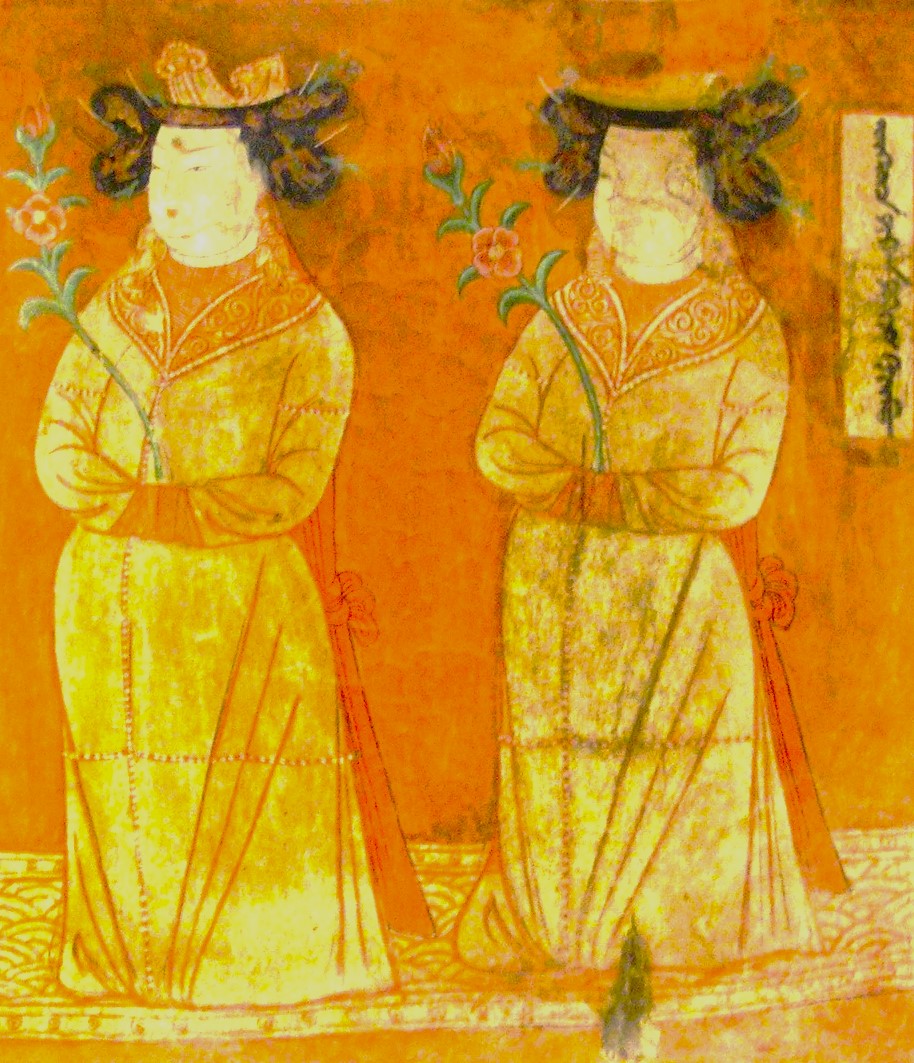
The rich history and vibrant culture of the Muslim Uyghurs in China as shown in this ninth- or tenth-century C.E. wall painting depicting Uyghur princesses attired in traditional dress at the time. Public domain via Wikimedia Commons
The collective voice of the international bodies about the plight of Uyghurs or are the Uyghurs have been overlooked? The Silence of the International Organisations and the Forgotten Uyghurs:[30]
The plight of the Uyghurs has received increasing attention from international bodies, but substantive action has been lacking so far:
- United Nations [31]– UN bodies like the Human Rights Council and Committee on the Elimination of Racial Discrimination have raised concerns about mass detention, surveillance, and discrimination against Uyghurs. But China has denied UN unfettered access to independently investigate reports.
- International Criminal Court – Some activists have called for investigating Chinese officials for genocide against the Uyghurs. However, China is not a member of the ICC, limiting its jurisdiction. The ICC has not taken up investigations so far.
- Western governments – The United States and several Western countries have sanctioned some Chinese officials over abuses in Xinjiang. The US designated China’s actions against Uyghurs as “genocide” in 2021. But economic and diplomatic ties limit more forceful actions.
- Muslim countries – Despite brutal repression of Muslims, countries like Saudi Arabia, UAE, and Pakistan maintain close ties with China and rarely raise the Uyghur issue publicly. Their strategic economic interests with China typically prevail.
- NGOs and media – Human rights groups like Amnesty International, Human Rights Watch and advocacy groups like the World Uyghur Congress have actively campaigned to raise awareness of the Uyghurs’ plight globally. Investigative media reports have also shed light on the camps.
The Uyghur issues receive periodic attention but are not a top-level priority for most international bodies and governments. China’s economic and military strength has muted the global response. Concrete action has been lacking so far besides some sanctions and strongly worded condemnations. The situation remains complex with no clear resolution in sight.
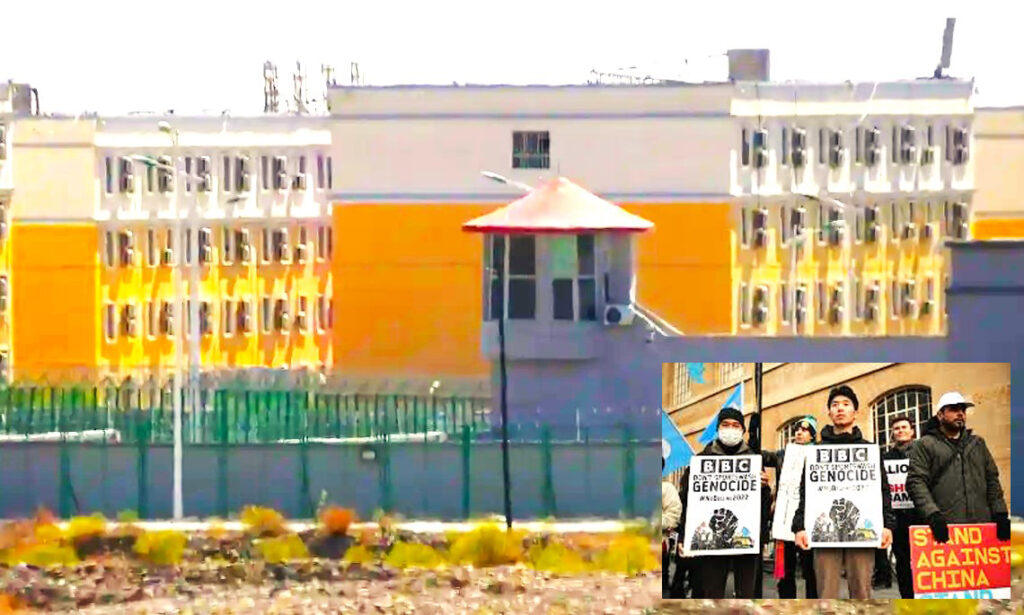
A Uyghur Education Training Centre near Kashgar Xinjiang, China. A Uyghur Internment and Training Camp, called by China as Vocational Training Centres. Xinjiang expert Adrian Zenz said China’s white paper gave clues as to the scope of forced labour in the region.
Photo credit Greg Baker AFP/Getty Images
The future of the Uyghurs in Peoples Republic of China:[32]
The future of the Uyghur people in China remains uncertain and depends heavily on the policies of the Chinese government:
- Assimilation:[33] If current policies continue, the Chinese goal appears to be full assimilation of Uyghur identity into the dominant Han culture. This would essentially erase Uyghur language, religion and customs over the coming decades, amounting to a cultural genocide according to critics.
- Increased repression: Harsher crackdowns could intensify if Uyghur resistance grows. Repression could reach terrifying levels with mass incarceration, relocation and high-tech surveillance creating an Orwellian dystopia in Xinjiang.
- Migration: Ongoing migration of Uyghurs to inland China or abroad could create more diaspora communities and a fading Uyghur presence within Xinjiang itself. However, China tries to limit this migration.
- Resistance: Non-violent or even violent resistance could emerge, leading to instability, ethnic clashes and a harsh state response. However, this remains unlikely currently due to intense security controls.
- International pressure: External economic sanctions or actions against China could make it recalculate costs of repression versus liberalization of policies towards Uyghurs. But China’s global clout makes this unlikely.
- Reconciliation: A more optimistic but less probable scenario is China relenting on assimilation, allowing Uyghur language and cultural education, Islamic practice and some political autonomy in Xinjiang.
Overall, without a significant change in the orientation of the Chinese government, the unfortunate reality is that the unique Uyghur identity faces immense pressure and a gradual road towards potential extinction. The CCP views assimilation as key to stability and national integration. Time will tell which policies ultimately prevail.
Uyghurs facing persecution in China have a few options for seeking refuge in other countries, but it can be very difficult:
- Seeking asylum – Uyghurs can apply for asylum in another country by demonstrating a well-founded fear of persecution based on race, religion, nationality, political opinion, etc. if returned to China. Successful asylum claims have been made in the US, Canada, Australia, Turkey, and some European nations.
- Refugee resettlement – The UNHCR sometimes directly resettles particularly vulnerable Uyghur refugee families from transit countries to a third country for permanent resettlement. This is fairly limited in scope.
- Alternative visas – Some Uyghurs manage to travel abroad on student visas or family reunification visas and then subsequently apply for asylum. But China restricts passport issuance.
- Difficulties – China’s global influence and lack of transparency make it hard to verify asylum claims. Limited refugee quotas and immigration restrictions in potential host nations also pose hurdles. Security concerns about Uyghur activist groups also complicate acceptance.
- Stateless status – Neighbouring countries like Kazakhstan have rendered some Uyghurs stateless by revoking citizenship. These populations have few rights and little hope of resettlement.
While legal asylum pathways exist for persecuted Uyghurs, the reality is quite challenging. Uyghur refugees and dissidents often face an precarious existence, detained in transit countries or living marginally in diaspora communities with China seeking their extradition. Unless nations make Uyghur refugee protection more of a priority, options remain limited.
The Uyghur language and literacy levels:[34],[35]
- Language: The Uyghur people have their own Turkic language, also called Uyghur. It is written using a modified Arabic script and sounds very different from Chinese. Many Uyghurs view preserving their language as vital to their culture.
- Bilingualism: Younger urban Uyghurs in China tend to be bilingual in both Uyghur and Chinese Mandarin, the official language. However, many older and rural Uyghurs may have little to no knowledge of Chinese.
- Language policy: The Chinese government promotes Mandarin for official functions and prioritizes it in Xinjiang education. Uyghur-language schooling is restricted, making it harder for Uyghurs to achieve literacy in Uyghur.
- English skills: Knowledge of English among Uyghurs is generally low, as it is not emphasized in Chinese schools in Xinjiang. Some Uyghurs who migrate as students or workers may acquire basic English ability.
- Chinese literacy: Younger Uyghurs educated in the Chinese system have at least basic Chinese literacy. But overall literacy rates in Xinjiang are quite low compared to national averages.
- Persecution: China has targeted Uyghur intellectuals promoting the Uyghur language and knowledge specialists. This makes advancing Uyghur language literacy more difficult.
While many Uyghurs speak their native tongue, Mandarin and English skills vary greatly by age and background. Ongoing persecution in Xinjiang hampers efforts to promote broader literacy and education among Uyghurs in all languages.
However, there are Uyghur professionals in various fields, but they face significant barriers and discrimination:
- In China: There are some Uyghur professionals in Xinjiang and other parts of China, but relatively few compared to Han Chinese. They work as doctors, teachers, academics, lawyers and engineers. However, systemic discrimination makes it very difficult for Uyghurs to advance professionally.
- Outside China: The Uyghur diaspora worldwide includes professionals who have managed to emigrate and continue their careers abroad. For example, there are Uyghur medical doctors in Australia, academics and writers in Turkey, entrepreneurs in Europe, engineers and non-profit workers in the US and Canada.
- Barriers faced: Inside China, Uyghurs face discrimination in hiring, restrictions on movement, arbitrary arrests and surveillance. Language policies favouring Mandarin also limit professional opportunities. Even outside China, Uyghur professionals report harassment and threats by the Chinese government.
- Targeting intellectuals: China has actively targeted Uyghur intellectuals and community leaders for detention and persecution, in an effort to suppress Uyghur identity. This makes pursuing careers, very risky
- Culture loss: Repressive policies in Xinjiang restrict Uyghur language education, cultural expression and knowledge transfer between generations. This loss of culture makes it harder for Uyghurs to advance professionally even if conditions improve.
While some Uyghur professionals persist around the world, systemic discrimination inside China and continuing persecution of exile communities means their numbers are relatively small and opportunities remain constrained compared to other groups. Essentially the plight of the Uyghurs has been forgotten for significant reasons due to the factors that may contribute to this:
- China’s global influence: As a major economic and military power, China exerts significant diplomatic pressure to mute criticism of its policies towards Uyghurs. Many countries are hesitant to take strong action against China.
- Access restrictions: China limits independent access and journalism in Xinjiang, making it hard to verify details and keep the issue in the spotlight. Conflicts with more open access tend to get more media coverage.[36]
- Competing priorities: The UN and leaders of many countries have a multitude of crises demanding attention at any time. Major wars and refugee events understandably require immediate responses. Quieter crises can be overlooked or neglected.
- Lack of geopolitical significance: Xinjiang’s remote location, and the Uyghur’s lack of influence on global oil/gas markets or strategic waterways, reduces global interest in engagement.[37]
- Deflection tactics: China often deflects criticism by pointing to discrimination minorities may face in Western nations as well.[38] This complicates the global discourse.
In many ways the Uyghurs have slipped through the cracks compared to other ethnic conflicts. However, there are still many activist groups, human rights NGOs, and political leaders speaking up for the Uyghurs. With perseverance, more substantive international action could still emerge. But progress is likely to be slow and incremental given China’s international standing in global business and economy
The Bottom Line is that there are several key challenges experienced by the Uyghur population in mainland China:
- Restriction of religious freedom and cultural practices: The Chinese government has implemented policies to restrict Islamic practices and Uyghur cultural traditions in Xinjiang.[39] This includes banning certain Muslim names, restricting fasting during Ramadan, and demolishing mosques. There are also bans on wearing headscarves and growing long beards. This suppresses Uyghur identity.
- Mass surveillance and lack of privacy: Xinjiang is under heavy surveillance, including facial recognition cameras, phone monitoring, DNA sampling and home stays by Communist Party workers.[40] This severely limits freedoms and creates a culture of fear and mistrust.
- Arbitrary detention: Hundreds of thousands of Uyghurs have been arbitrarily detained in internment camps and prisons in Xinjiang. Detainees are subjected to forced labor, torture, political indoctrination and abuse with no due process. Families are often separated with no information about loved ones.
- Coerced assimilation policies: The camps and coercive programs are intended to forcibly assimilate Uyghurs by making them renounce Islam and embrace the dominant Han Chinese culture. This amounts to cultural genocide according to many experts.
- Lack of economic opportunities: Discriminatory policies limit Uyghur language education, job prospects and economic mobility. Uyghur intellectuals and entrepreneurs are especially targeted. This exacerbates poverty and resentment.
- Demographic manipulation: The Chinese government has implemented policies to reduce the Uyghur population percentage in Xinjiang[41] by moving in millions of Han Chinese migrants and placing Uyghur children in state-run orphanages[42]. This marginalizes the Uyghurs demographically and culturally.
These restrictive policies deprive Uyghurs of political, religious, cultural and economic freedoms, as well as subjecting them to pervasive discrimination, surveillance and forced assimilation. Many Uyghurs feel their way of life is under existential threat in their own homeland. are a few ways the Uyghur community has had some impact globally, though it remains limited:
- Raising awareness – Uyghur activist groups have worked to increase global awareness and media coverage of their plight in Xinjiang. Reports and campaigns have brought more attention to the human rights abuses.
- Exile culture – Uyghur diaspora communities worldwide help preserve and promote Uyghur culture, literature, music and language. This raises the profile of Uyghur identity on the global stage.
- Security concerns – Some violent incidents associated with Uyghur separatist groups have led to a perception that domestic Uyghur discontent could potentially impact global stability and Chinese counterterror partnerships.
- Trade and supply chains – There is growing concern that forced labor programs involving Uyghurs are tainting global supply chains in sectors like cotton, tomatoes and electronics. Some multinationals are cutting ties with Xinjiang.
- Geopolitics – China’s crackdown in Xinjiang raises human rights concerns that complicate diplomatic relations and periodic calls for boycotts of the Beijing Olympics and other events in China[43].
- Islamophobia – Repression of the religiously conservative Uyghurs provides fodder for extremist rhetoric stereotyping and discriminating against Muslims more broadly[44].
However, overall the Uyghur cause remains fairly marginal in most international discourse on human rights and ethnic conflicts. Their limited global diaspora and constrained political voice within China mean their impact has been quite muted so far compared to other oppressed groups worldwide. But persistence of activist groups continues to gradually elevate their profile, globally. Essentially the “Uyghurs Lives do not matter[45],[46] in the Global Scheme of Importance and they are the CONVENIENTLY Forgotten Sufferers of an oppressive Chinese regime, as are the Gazains under Israel[47],[48],[49] the Kashmiris under the BJP Indian Government.[50] This philosophy against the Uyghurs is principally the end result of ensuring the status quo in the primary pursuit of materialism, by the global communities, to the sacrifice of humanitarian values in the 21st century[51].
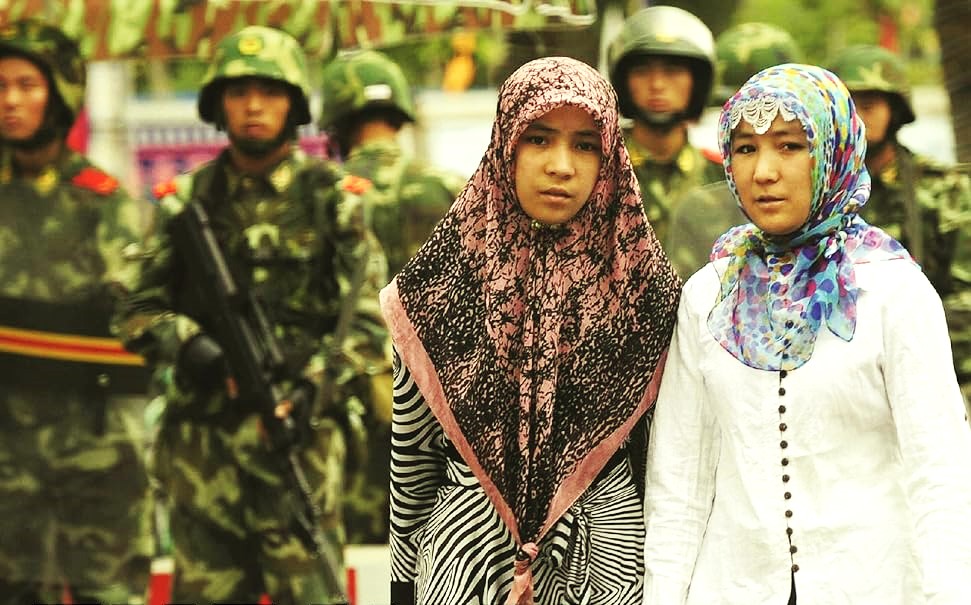
Uyghur oppression in China: A large group of Muslim ladies protesting against harassment, by Chinese army.
References:
[i] Personal quote by author, November 2023
[ii] https://jacobin.com/2019/06/china-uyghur-persecution-concentration-camps
[1] https://en.wikipedia.org/wiki/Sinicization
[2] https://www.jstor.org/stable/26548912
[3] https://www.transcend.org/tms/2023/11/the-forgotten-part-1-kashmir-heaven-on-earth-turned-hell-on-earth-by-21st-century-india/
[4] https://en.wikipedia.org/wiki/Sinicization
[5] https://www.transcend.org/tms/2023/11/the-7-oct-2023-hamas-invasion-of-israel-an-alternative-viewpoint-on-the-palestinian-genocide/
[6] https://en.wikipedia.org/wiki/Xinjiang_internment_camps#:~:text=The%20Xinjiang%20internment%20camps%2C%20officially,Communist%20Party%20Provincial%20Standing%20Committee.
[7] https://www.theguardian.com/world/2020/sep/24/china-has-built-380-internment-camps-in-xinjiang-study-finds
[8] https://www.cfr.org/backgrounder/china-xinjiang-uyghurs-muslims-repression-genocide-human-rights
[9] https://www.bbc.com/news/world-asia-45812419
[10] https://www.bbc.com/news/world-asia-china-22278037
[11] https://link.springer.com/article/10.1007/s40167-014-0020-x
[12] https://en.wikipedia.org/wiki/Xinjiang
[13] https://www.thelancet.com/journals/lancet/article/PIIS0140-6736(21)00033-7/fulltext
[14] https://www.refworld.org/docid/55e59cac2b.html#:~:text=HIV%2FAIDS%20has%20been%20on,with%20knowledge%20of%20the%20situation.
[15] https://www.ncbi.nlm.nih.gov/pmc/articles/PMC8667973/
[16] https://pubmed.ncbi.nlm.nih.gov/17601003/
[17] https://www.britannica.com/topic/Uyghur
[18] https://www.britannica.com/place/Xinjiang
[19] https://en.wikipedia.org/wiki/Kyrgyzstan
[20] https://en.wikipedia.org/wiki/Manichaeism
[21] https://en.wikipedia.org/wiki/Tarim_Basin
[22] https://en.wikipedia.org/wiki/Xinjiang_under_Qing_rule
[23] https://www.ncbi.nlm.nih.gov/pmc/articles/PMC2790568/
[24] https://www.sciencedirect.com/science/article/pii/S0092867420313210
[25] https://www.britannica.com/place/Xinjiang/Economy
[26] https://www.equalrightstrust.org/ertdocumentbank/ERR06_Rayila_article.pdf
[27] https://www.bbc.com/news/world-66337328
[28] https://en.wikipedia.org/wiki/Uyghurs_in_Kazakhstan
[29] https://www.refworld.org/docid/4e5f718dc.html
[30] https://www.ourcommons.ca/Content/Committee/432/FAAE/Reports/RP11164859/sdirrp04/sdirrp04-e.pdf
[31] https://www.ohchr.org/en/press-releases/2022/08/un-human-rights-office-issues-assessment-human-rights-concerns-xinjiang
[32] https://www.aspistrategist.org.au/chinas-uyghurs-face-an-orwellian-future/
[33] https://www.irenees.net/bdf_fiche-experience-658_en.html
[34] https://www.borgenmagazine.com/education-in-xinjiang/
[35] https://www.borgenmagazine.com/education-in-xinjiang/
[36] https://www.bbc backgrounder.com/news/world-asia-china-55666153
[37] https://www.cfr.org/ /china-xinjiang-uyghurs-muslims-repression-genocide-human-rights
[38] https://www.abc.net.au/news/2021-07-20/china-responds-to-western-criticism-of-human-rights-record/100295550
[39] https://www.hrw.org/news/2023/11/22/china-mosques-shuttered-razed-altered-muslim-areas
[40] https://www.hrw.org/report/2021/04/19/break-their-lineage-break-their-roots/chinas-crimes-against-humanity-targeting
[41] https://igg-geo.org/?p=1829&lang=en#:~:text=Chinese%20government%20population%20control%20strategies,Abortions%20and%20Madatory%20Birth%20Control.
[42] https://www.independent.co.uk/news/world/asia/china-uighurs-human-rights-muslims-orphanages-xinjiang-province-reeducation-a8548341.html
[43] https://news.un.org/en/story/2022/08/1125932
[44] https://www.ohchr.org/sites/default/files/Documents/Issues/Religion/Islamophobia-AntiMuslim/Civil%20Society%20or%20Individuals/HumanRightsCentreClinic.docx
[45] https://www.quora.com/Do-Uyghur-lives-matter-in-China-1
[46] https://www.transcend.org/tms/2023/08/palestinophobia-and-africanophobia-apartheid-parallels-in-contemporary-history/
[47] https://www.transcend.org/tms/2023/09/heavenly-peace-of-the-oppressor-and-hellish-peace-of-the-oppressed/
[48] https://www.transcend.org/tms/2023/06/international-criminal-court-advancing-global-injustice-uaccountability-and-criminal-agenda-against-guardians-of-peace/
[49] https://www.transcend.org/tms/2023/06/peace-disruption-part-2-palestines-killing-fields-the-end-must-go-on/
[50] https://www.transcend.org/tms/2023/10/the-religious-transformative-odyssey-of-bharat-part-2-manipur/
[51] https://www.jstor.org/stable/23024595
______________________________________________
READ: PART 1 – PART 3 – PART 4 – PART 5 – PART 6
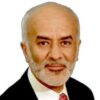 Professor G. Hoosen M. Vawda (Bsc; MBChB; PhD.Wits) is a member of the TRANSCEND Network for Peace Development Environment.
Professor G. Hoosen M. Vawda (Bsc; MBChB; PhD.Wits) is a member of the TRANSCEND Network for Peace Development Environment.
Director: Glastonbury Medical Research Centre; Community Health and Indigent Programme Services; Body Donor Foundation SA.
Principal Investigator: Multinational Clinical Trials
Consultant: Medical and General Research Ethics; Internal Medicine and Clinical Psychiatry:UKZN, Nelson R. Mandela School of Medicine
Executive Member: Inter Religious Council KZN SA
Public Liaison: Medical Misadventures
Activism: Justice for All
Email: vawda@ukzn.ac.za
Tags: Authoritarianism, China, Cultural violence, Direct violence, Genocide, Human Rights, India, Israel, Muslims, Palestinians, Structural violence, Uyghur, Violent conflict
This article originally appeared on Transcend Media Service (TMS) on 27 Nov 2023.
Anticopyright: Editorials and articles originated on TMS may be freely reprinted, disseminated, translated and used as background material, provided an acknowledgement and link to the source, TMS: The Forgotten (Part 2): The Uyghurs of Xinjiang–from Sinicization to Genocide, is included. Thank you.
If you enjoyed this article, please donate to TMS to join the growing list of TMS Supporters.

This work is licensed under a CC BY-NC 4.0 License.
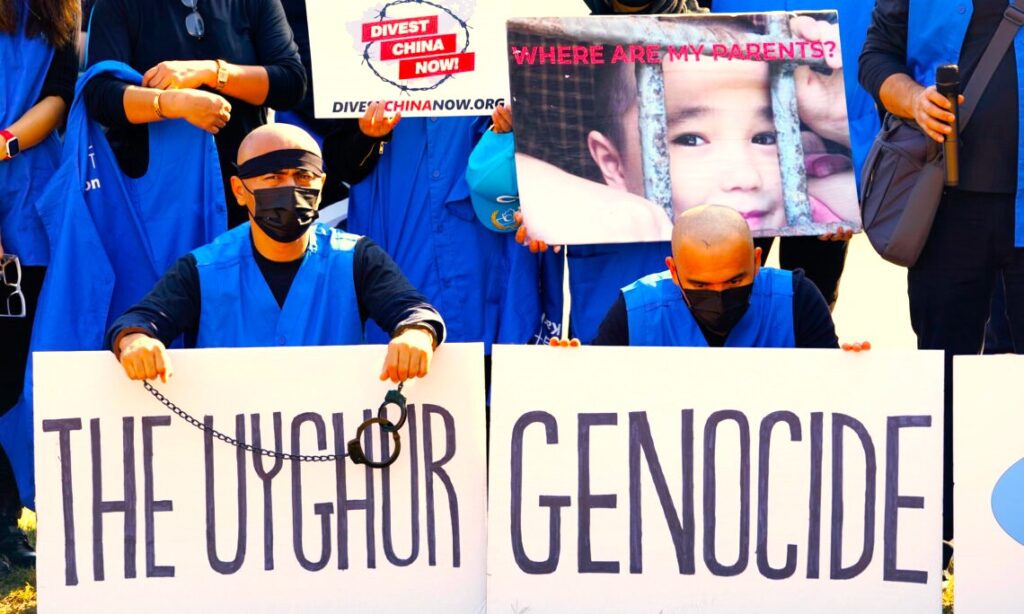
The Uyghurs have almost been forgotten, especially now with the more intense Israeli Genocide of the Palestinians. Thank you for keeping their just cause in front of human eyes. I am dedicated to exposing CCP promoters like Jeff J. Brown with whom I have had exchanges on Substack. I hope you will join me in debating with him and his Fellow Travelers like Daniel Dumbrill. My Substack on Brown’s worship of Mao https://responsiblyfree.substack.com/p/jeff-j-brown-hagiographer-of-mao
I will contact your email. Get free, stay free.
Professor C.S. Rosa
The Editor
TRANSCEND Media Service.
Submission of Publication
Dear Professor Carlos Antonio Silva Rosa
Trust Professor Rosa is well with the Lord’s cosmic energy and Divine Healing . May I send Professor Rosa my sincere Greetings of Peace, with wishes for intrinsic and extrinsic harmony.
At the outset, I submit my humble apology to Professor Rosa and Dr Jack Carney, not quite the famous broadcaster of the same name, for the inordinate delay in my response to his supportive comments in his e-mail of Tue, Nov 28, 2023 at 3:23 AM, which I acknowledge receipt of.
I am pleasantly surprised at the supportive comments in relation to the plight of Uyghurs in Xinjiang. In fact, none of the Transcend esteemed members have highlighted the sad odyssey of this sector of the oppressed, recently. I am indeed privileged to champion their cause, not because of their Islamic religious affiliations, but as marginalised members of the human race, by the Chinese. My research on Uyghurs exposes an appalling scenario and is a serios indictment to us, as Peace Propagating members of the esteemed , relevant and much needed Transcend Media Service, operated by Professor Rosa, under severely marginalised financial conditions, himself as a solo, “The Peace Propagator”.
I therefore avail myself, to participate in any debates, or discussions, which will highlight the plight of the Uyghurs. I would go further and suggest that I will be pleased to host a webinar series to highlight the “FORGOTTEN, OPPRESSED GLOBAL COMMUNITIES” in 2024, once a month, under the auspices of TMS, if Dr Jack Carney and others are available and agreeable to participate. This will be at my personal expense with NO costs to TMS, nor to Dr Jack Carney.
I respectfully look forward to your combined responses, to my suggestion, if you will.
In God we trust and pray that He grants Professor Rosa and the TMS members, boundless energy to continue with the excellent work you are all engaged in, on a basis of volunteerism.
Thank you for the feedback, much appreciated, I was of an opinion that nobody really cares, nor read my long, ponderous publications, but I am inspired to further my “Peace Propagatory” endeavours, following the encouraging feedback
Have a relaxed week and, thank you, once again.
I look forward to Professor Rosa’s kind responses, in Professor Rosa’s frenetic schedule.
Kind regards, wish you excellent health and fortitude.
Apologies for stressing Professor Rosa with my ponderous e-mail and suggestion, once again.
Thank you for your kind facilitation, as always.
Hoosen Vawda
Phone: + 27 82 291 4546
Professor Hoosen Vawda
(Bsc,MBChB,FCS(1)SA,ACLS,ATLS,NZ; PhD.Wits)
Director: Glastonbury Medical Research Centre
Director: Community Health and Indigent Programme Services
Director: Body Donor Foundation SA.
Activism: Justice for All
Principal Investigator: Multinational Clinical Trials
Consultant: Medical and General Research Ethics
Consultant to: Internal Medicine: UKZN, Nelson R. Mandela School of Medicine
Consultant to: Clinical Psychiatry: UKZN, Nelson R. Mandela School of Medicine
Member: Inter Religious Council KZN SA
Board of Trustees; Discovery Health: UKZNMS SA
Ministerial Appointee: Department of Arts and Culture SA
Sakha Ikusasa Elinempilo Sindawonye
#ObesityMustFall #PlasticsMustFall #ViolenceMustFall @HoosenVawda
God created Humanoids have the innate proclivity towards the pursuit of righteousness, truth and justice. We experience intense pain when witnessing oppression, corruption, injustice, discrimination, xenophobia, intimidation, hypocrisy, bigotry, corruption, violence and abuse. If you do not experience these feelings, then you are not human
Please spare a thought and prayers for the poor, orphans, elderly, the sick, infirm, displaced humanity, migrants, troubled world, suffering of children and the patients as well as the deceased from Covid-19 infections
We all join in an universal appeal to the Lord for the His Divine peace and harmony to prevail on Earth during these tumultuous times of the 21st Century, the ongoing genocidal killings in Palestine, Africa, Myanmar, the global hypocrisy, belligerence, and oratorial rhetoric, analogous to Mark Anthony’s eulogy at Caesar’s funeral, by global leaders, especially the Arab League and United Natins, while thousands are being annihilated, by tyrannical aggressors and Universal Peace Disruptors.